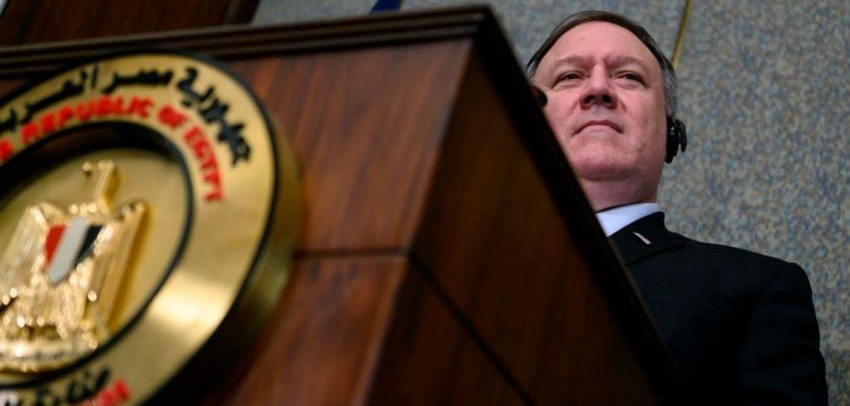Alwaght- On Tuesday, the US Secretary of State Mike Pompeo ended his 8-day regional visit starting from Jordan without traveling to Kuwait, the Arab country also on his schedule to visit.
During the visit, the top US diplomat did his best to bring the Arab allies of Washington under an alliance to help implement Washington's anti-Iranian policies.
He also transferred to the Arab capitals a set of US demands surrounding the Palestinian cause and also the largely shrouded-in-mystery “deal of the century”, designed by Trump's administration.
Easing the concerns of the allies and assuring them of continued protection even after the US troops’ withdrawal from Syria was another issue that drove the American Secretary of State’s visit.
Pompeo also pushed for the ease of tensions hitting the (Persian) Gulf Cooperation Council since 2017 when Saudi Arabia and three of its allies– Egypt, the UAE, and Bahrain– severed ties with Qatar and imposed a blockade on the small Arab emirate.
But did he achieve what he travel for? What does it mean for him to cut short his trip to the region?
Failing to build consensus amid deepening intra-Arab gaps
The Secretary of State had two aims behind his push to develop a consensus: To speed up the process of diplomatic normalization between the Arab states and the Israeli regime and to transfer the duty of protection of the American interests in the region to the regional allies through founding a NATO-style Arab force, also formally called by the Americans as Middle East Strategic Alliance (MESA), to realize Trump's election promise of cutting the US military spending and making the allies pay for their own security under the “America first” policy.
However, Pompeo failed to materialize his anti-Iranian agenda as Washington’s regional allies are hit by division and tensions with no prospects of a stop. For example, Saudi Arabia is with an open dispute with Qatar and a cleavage of views with Kuwait. Also, there is an atmosphere of distrust between Qatar, Egypt, and the UAE. The Intra-Arab divorce of view made it impossible for Pompeo to raise an anti-Tehran Arab unity represented by an Arab army.
In fact, the complexity in the relations of the West Asian countries effectively reflects its shadow on the adoption of an approach helping the US-eyed anti-Iranian policy. That is not everything in US list of failures. The Americans also faced problems implementing reinstated economic sanctions against the Islamic Republic.
The only outcome of Pompeo visit could be the announcement of a plan to hold a largely staged, Iranophobic conference on February 13 and 14 co-hosted by the US and Poland in the Polish capital of Warsaw. The scheduled meeting is seen by the analysts as mirroring the defeat of Pompeo’s trip in reaching what the diplomat traveled to the Arab allies for. To put it differently, what he could not achieve in his trip is sought to be achieved through mid-February event. To hide the genuine nature of the conference, the US accentuated the international face of it and said it will discuss security and peace in West Asia region.
But none of the European allies of Washington, mainly Paris, London, Berlin, and Brussels approved to host the meeting, an issue signaling differences of the US and its closest allies about the West Asia policy. The US and Europe are at odds over a set of regional cases including Palestine, the Trump plan to move US forces out of Syria, and Iran nuclear deal and reinstatement of the embargo on Tehran.
What do the polls say?
Recently, Zogby polling institute, one of the top international polling organizations and a key advisory partner to the US Senate Select Committee on Intelligence, has conducted a poll in eight West Asian countries, concluding that a majority of the public opinion disagree with the US policies in the region. The poll suggests that a majority of regional people, excluding Saudi Arabia and the UAE’s, do not really approve of the US policies. The institute says it is noteworthy to say that the US popularity in Egypt and Iraq is very small. The institute adds that the invasion of Iraq and occupation of it are the key issues behind the unpopularity of the US in the region. It continues that a top issue for the people in subject countries is the end of Palestine occupation.
Both in Egypt where Pompeo recently made an address, and Iraq, which also hosted Pompeo, 90 percent of the population do not have a positive view of the US, the poll finds. 61 percent of the Egyptian poll participants said they opposed tough sanctions on Iran or US support to Arab bloc in the face of Tehran. Joan Cool, a West Asia expert at Michigan State University, in his book Common Dreams addresses the issue. He argues that he was surprised by the views on the so-called grand alliance against Iran and the low degree of support to it.
Nowadays, giving attention to the public opinion in political decisions is highly significant. The public is decisive in foundation, maturity, and competition of the political discourses. A good proof to the validity of this claim is the caution of Arab dictators who despite their openness to political normalization with the Israeli regime and driving out of agenda the Palestinian cause are rejecting to bow to the US pressures for publicized relations with Tel Aviv for the fear of backlash by their people and opposition by a majority of Muslim countries.
It is important to say that the polls very plainly talk about the US policies’ total loss in the region over the past decades. On the contrary, the public opinion support the Iran-led Axis of Resistance’s policies which seek liberating the regional nations of the yoke of Western powers, uniting the Muslim states against the Israeli violations against the Palestinians and neighbors, and effectively fighting the takfiri ideology that is aimed at sowing division among the Muslims.



























